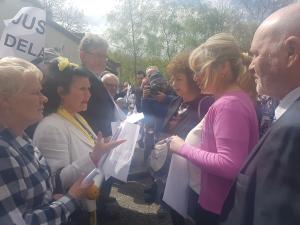
By David Young, Press Association
A compensation scheme for survivors of historic abuse in children's homes across Northern Ireland could cost in the region of £114 million.
It is understood a modelling exercise carried out by Stormont officials has estimated a total of £97 million being awarded in redress to survivors, with an added £17 million needed to fund both the mechanism that will assess and deliver the payments and a full-time commissioner's role to advocate for those who suffered.
The details emerged as draft legislation for the scheme was published - almost two years on from the publication of an inquiry report that recommended compensation payments ranging from £7,500 to £100,000.
The proposals put forward by the Historic Institutional Abuse inquiry (HIA), chaired by retired judge Sir Anthony Hart, are mired in uncertainty due to the ongoing Stormont impasse.
They were published just as the DUP/Sinn Fein-led executive was imploding in January 2017, so no elected ministers have been able to take action.
The head of the Northern Ireland Civil Service, David Sterling - the man effectively running day-to-day services in Northern Ireland amid the political deadlock - has pledged to do as much as he can to bring the recommendations to a state of readiness for such time as when elected politicians are in place to take decisions, be they Stormont or direct rule ministers.
As such, he asked civil servants to draft legislation so everything would be in place to proceed with the scheme once a measure of stability returns to Stormont's rudderless public services.
The proposals were published on Monday afternoon and will now go out for a public consultation exercise.
"I have met with victims and survivors of historical institutional abuse on several occasions since being appointed Head of the Civil Service," said Mr Sterling.
"I have heard harrowing personal accounts of the destructive impact the abuse has had on many people.
"Many of them feel that there is no escape and unfortunately that is something that will live with them for a very long time. They have told me that many years later they are still hurting, still suffering."
While officials are characterising the publication as an important milestone, it could still be years before the scheme is up and running.
Even if ministers are back in post when civil servants make their final recommendations based on consultation responses - likely in April or May next year - the legislative journey to turn the proposals into law could take another 18 months.
If the political crisis is still ongoing next spring, then that timeframe would be pushed out further.
A 12 week consultation has opened to help decide how victims of historic abuse in Northern Ireland should be compensated. Here’s Margaret McGuckin from SAVIA pic.twitter.com/vPiDeKu45v
— Hannah Spratt (@Radio_Han) November 19, 2018
Once it is operating, applicants will be required to make an application to a Redress Board, made up of retired judges, who will then assess whether or not the individual was a victim of abuse, based on the balance of probabilities legal test.
If the application is approved, the judges will then determine an appropriate amount, with £7,500 set as the baseline.
The maximum pay-out for abuse meted out will be £80,000. However, all those children who were transported to Australia after being kept in homes in Northern Ireland - around 131 - will be entitled to an automatic £20,000.
So a victim who suffered sustained and severe abuse in Northern Ireland and who was then transported to Australia could be entitled to £100,000
Mr Sterling said: "I have delivered on my undertaking given earlier in the year to victims and survivors of historical institutional abuse, that The Executive Office would prepare the necessary legislation to establish a Redress Board and a Commissioner for Survivors of Institutional Childhood Abuse.
"This has been a challenging and complex area of work, particularly in the absence of an Executive, however we owe it to the victims and survivors to do all we can for them. I urge anyone who has an interest to contribute to this consultation on the draft legislation."
It is understood the total financial estimates are provisional, with officials conceding that the final sum may be more, or less.
A total of 526 people came forward to tell their stories. Officials cite the example of a similar inquiry in the Irish Republic - the Ryan Commission - which saw the number of people actually applying for compensation exceeding the numbers who gave evidence by ten-fold.
Applying that to the HIA, there could be a potential for around 5,260 applications for redress. With Sir Anthony having estimated the average pay out at £18,500, that would give a total of £97.3 million.
The Redress Board would cost £10 million to run for 10 years, while the commissioner's costs would be £7 million over the same time frame - giving a total of £114.3 million.
Sir Anthony's inquiry found evidence of widespread and systemic abuse in children's homes across Northern Ireland.
Some abuse survivors have insisted the £7,500 is too low and have instead advocated a £10,000 starting point.
Jon McCourt, chairman of the Survivors North West group - who told the inquiry he suffered abuse while at St Joseph's Children's Home in Londonderry, said he wanted a fair deal for all victims.
He was one of a number of victims' representatives briefed on the detail of the scheme by Stormont officials on Monday.
"Abuse survivors have already told government that the flat £7,500 common experience payment is, frankly, derisory," he said.
"Victims think that payments should start at £10,000 and be graduated according to the number of years spent in a residential institution.
"This would acknowledge that the longer a child was in an institution acknowledged by the Inquiry as 'harsh and brutal', the greater harm the child would have suffered.
"All we want is a fair deal and this isn't it."
The HIA studied allegations of abuse in 22 homes and other residential institutions between 1922 and 1995. There were 76 homes in total that operated during that timeframe and abuse victims from all of them are eligible to apply for compensation.
The facilities were run by the state, local authorities, the Catholic Church, the Church of Ireland and the children's charity Barnardo's.
The largest number of complaints related to homes run by the De La Salle and Sister of Nazareth Catholic religious orders.
Sir Anthony concluded that due to the brutality of the regimes in those six homes between the 1940 and 1960s, all residents were entitled to compensation.
Patrick Corrigan, Northern Ireland director of Amnesty International, which is supporting victims, said they deserve better.
"Victims of institutional child abuse have had to suffer the consequences for their whole lives," he said.
"Now they are being asked to accept a redress scheme that simply does not meet the standards of natural justice.
"They have a right to better and we are determined that they will get justice."
The consultation will be advertised across Northern Ireland, Ireland, Britain and Australia. It will run until 10 February 2019.
More information and details on how to respond are available at www.executiveoffice-ni.gov.uk/HIA-consultation and http://www.executiveoffice-ni.gov.uk/HIA-consultation.


 Gerry Adams awarded 100,000 euro in damages after suing BBC for libel
Gerry Adams awarded 100,000 euro in damages after suing BBC for libel
 Victim held in room while masked men ransack Saintfield home
Victim held in room while masked men ransack Saintfield home
 Nesbitt not surprised if ‘devastating’ culture in RVH report repeated elsewhere
Nesbitt not surprised if ‘devastating’ culture in RVH report repeated elsewhere
 Pensioner, 82, killed in crash near Omagh
Pensioner, 82, killed in crash near Omagh
 Kneecap announce new song ahead of headline performance at London’s Wide Awake
Kneecap announce new song ahead of headline performance at London’s Wide Awake